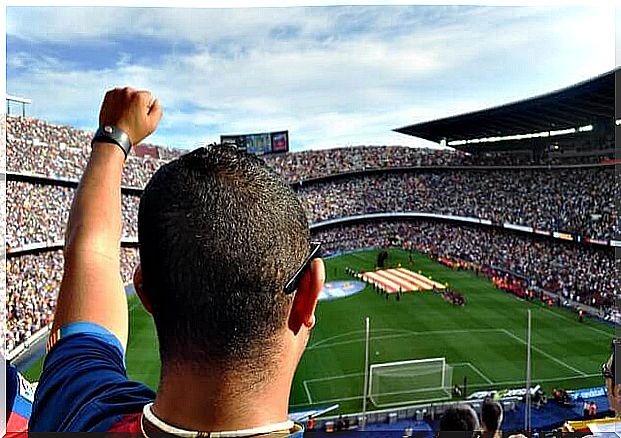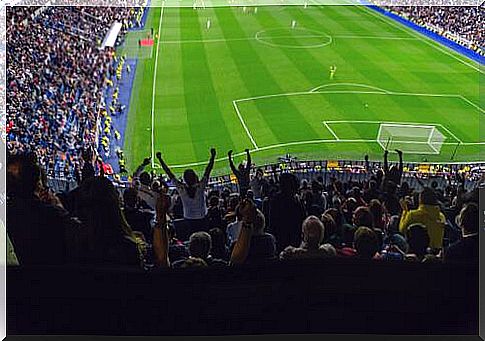Why Is There So Much Violence In Football?

Violence among football fans is too frequently observed a phenomenon. What is this behavior due to? In this article, we will discuss some theories that address the issue.
Why is there so much violence in football, and more specifically among fans? Too often we see terrible events occurring between rivals.
One of the last violent events was observed during the Copa Libertadores final between Argentina’s teams River Plate and Boca Juniors. The consequence of the violence generated between different groups of supporters was as follows: instead of being played in Argentina, the final had to be played in Spain.
There are many people who are perplexed and doubtful about such collective behavior and who do not understand the reasons which justify them.
Nonetheless, psychology has been studying the social behavior of groups for years. For this reason, we will try through this article to shed light on what is hidden behind such behavior, such violent and aggressive behavior.
Violence in football from the process of deindividuation
There is no single theory that brings together all the reasons for these facts, but there are theories that address them.
First, we will discuss disindividuation to explain violence in football. This process does not explain violence per se, but group behavior.

Say we are watching a soccer game and one of the players from the opposing team is standing by our side. If we intend to insult him but are surrounded by supporters of the opposing team, it is very likely that we will not take action. However, what would happen if we were surrounded by supporters of our own team?
If the supporters around us are for the same team as us and their intention is also to insult, we will actually end up verbally assaulting the player of the rival team. What is the difference between the two situations? Anonymity and responsibility.
As Moral, Gomez and Canto (2004) have pointed out, “in these situations, anonymity, group and reduced individual personal awareness lead individuals to engage in uninhibited, impulsive and substandard behaviors” .
When we can rely on anonymity, we become more inclined to perform violent actions. It will be more likely that we indulge in insults if no one knows we are doing it than if we are the center of attention. On the other hand, when we are in a group, personal awareness decreases. This happens because we are transferring our responsibility to the whole group. We cease to be ourselves and we become the group. We may even end up thinking “ I’m not insulting, it’s the group that’s insulting ”.
Conformism process
Conformism is another process that could explain violence in football. This process consists of modifying an individual’s response by bringing it closer to that which the majority of individuals express. In fact, it amounts to changing our attitude in order to adapt it to that of the group.
As Paéz and Campos (2003) pointed out, “ conformism is the change in beliefs or behavior due to pressure from a group which modifies the subject’s prior dispositions towards the norm established by the collective in question ”.
Within groups we can find different types of standards. Among them :
- The descriptive standard, which refers to how to act in a group
- The prescriptive standard, which refers to expected behavior
Conformism is a type of normative influence. Indeed, the individual is able to change his personal behavior in order to adapt it to that of the group. He is even capable of having behaviors totally opposite to those he would have individually.
Thus, if our reference group behaves in a violent manner, it would not be strange for us to adopt this type of behavior. This conformism increases as the group’s levels of control over its members and the interdependence between them also increase. But also when there is some uncertainty or ambiguity. So it happens when we say to ourselves “I don’t know what to do, so I adopt the behavior of the group”.
Conformism increases when there is a similarity between the group and the individual. If someone feels very identified with the football team they support and with the violent ideology of a group of supporters, they will be more likely to demonstrate violent behavior.

Final reflection
Violence in football is a reality we experience too frequently. Inordinate expectations of external stimuli promote the transfer of our happiness in events such as football matches.
If we have not received a proper education and are used to resolving differences by resorting to violence, it will be difficult for us not to have aggressive reflexes in case of disagreement. Thus, a correct and respectful education towards others is an important basis in order to avoid this type of behavior.
A rich inner world and an open, reflective mind will give us the necessary strength and reduce our need for group membership. Behind this need often hides a lack of self-esteem, which one tries to overcome by belonging to a group.
The feeling of belonging generates in us a feeling of emotional fullness. In fact, when we have not been able to develop our own personal fullness, we look for it elsewhere.
Learning and knowing each other will be fundamental so as not to end up in groups where violence reigns. The lower our self-esteem and the “stronger” our group, the more we will need to belong. So, if we start by respecting ourselves personally and by respecting others, this type of event will soon only belong to the past.










